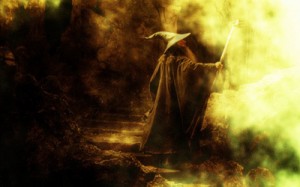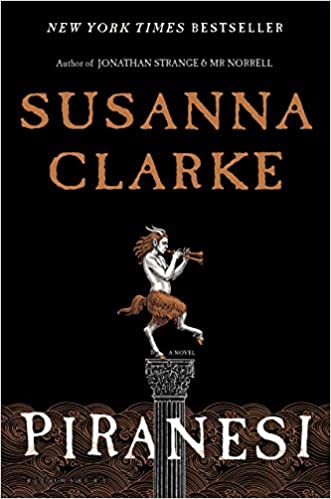Gandalf for President
 I’ve found myself irritated a few times lately by the expressed contempt of democrats for conservatism. So I want to get some thoughts clear here in this space.
I’ve found myself irritated a few times lately by the expressed contempt of democrats for conservatism. So I want to get some thoughts clear here in this space.
There’s an arrogance in several discussions I’ve read lately that suggests something like, “We’re going to take the country over now and get things right.” Mrs. Clinton, at the debate in Texas, made some reference to how the world is going to rejoice when Bush leaves the White House, then followed it up with a smug, “We all know that.”
I’m a conservative, though let me be clear: I’m disappointed in the Bush administration. I think the level of corruption (granting that I’m at the mercy of a journalistic lens that is always looking for dirt) is especially demoralizing from a president who’s been so vocal about his faith — a faith I share, and which professes a high ethical standard. I’m disappointed in the way the war in Iraq has been prosecuted, though I don’t think the general dialogue about it these days, with 20-20 hindsight, is fair. (This post at the Thinklings site is a good discussion on the subject.) I agree with David Gergen in his opinion that the Bush administration (i.e. Karl Rove) brought a mistaken view of governance that involved getting a 51% majority and forcing things through without earning consensus through vision and leadership. All of this to say I’m not a “republican right or wrong.” In fact, I’m using “conservative,” not “republican,” because there’s not a whole lot of real difference between the two major political parties.
That said, I’m still conservative in my political leanings, not because I’m a simpleton (I have a PhD), or a religious fundamentalist (I read other things besides the Bible). Why? Because I think government is a human institution, an instrument through which one group inflicts its will on others. Even government “of, by, and for the people” boils down to this; it’s still power managed by a few. If government is brute force in the hands of humans, it’s going to be corrupt, and its corruption is located not in one party or the other, but in humanity. Therefore, the less human political structure, the better. That’s why I’m conservative. (”Conservative” applies to my stance on moral issues too, but I’m not tackling that aspect here.)
The liberal chatter all suggests that a new party will bring purity. I think that’s pretty naive. Not only will a different political party in power fail to bring purity; if it’s a democrat administration, it will bring more government, therefore more corruption. Government as an agent for the cleansing of society is about as effective as using mud to wash the dishes.
I’ve been mulling this in light of Tolkien’s Ring of Power in LOTR. It makes a pretty good symbolic picture of political institutions. When we first learn that Bilbo’s trick ring is really the ”One Ring to rule them all,” Frodo offers it to Gandalf. But Gandalf is wise enough to recognize that its power can’t be managed; it’s a power that consumes. I think he has a more healthy and realistic view of power than most politicians who favor big government:
Do not tempt me! For I do not wish to become like the Dark Lord himself. Yet the way of the Ring to my heart is by pity, pity for weakness and the desire of strength to do good… The wish to wield it would be too great for my strength.
I instinctively trust those serving in public life who regard political office with this kind of apprehension.
I instinctively distrust those who run after it giddily, thinking they can control it. Boromir comes to mind as an example of this type:
Saruman is a traitor, but did he not have a glimpse of wisdom?… Why should we not think that the Great Ring has come into our hands to serve us in the very hour of need? Wielding it the Free Lords of the Free may surely defeat the Enemy… Valour needs first strength, and then a weapon. Let the Ring be your weapon, if it has such power as you say. Take it and go forth to victory!
Boromir speaks with the naivete of those who consider themselves righteous and invincible. (Certain political figures come to mind.) But Elrond responds, “The very desire of it corrupts the heart.” I tend to agree when governing power is the thing viewed as a weapon for doing even the Lord’s work. (This is why I have trouble with Huckabee.) Tolkien suggests that it’s impossible to desire power virtuously. Maybe he’s right. Maybe that’s why there’s no such thing — at least to my knowledge — as virtuous government.
The other example in the story is Galadriel. Frodo offers her the ring too, and she like Gandalf is tempted:
You will give me the ring freely! In place of the Dark Lord you will set up a Queen. And I shall not be dark, but beautiful and terrible as the Morning and the Night! Dreadful as the Storm and the Lightning! Stronger than the foundations of the earth. All shall love me and despair!
Even in her desire for the Ring, the threads of her undoing are apparent. Beauty mixed with terror. Love and despair. She passes the test, and suddenly looks “shrunken” to Frodo, “a slender elf-woman, clad in simple white.” ”I pass the test,” she says. “I will diminish… and remain Galadriel.”
To me this is a truthful exploration of what the lust for power does to people. Those who retain their integrity, their identity, their virtue, do so in the refusal of power. It’s not possible to have government, which in our country is run only by those who seek its power (as opposed to being born into it), without inheriting some degree of the corruption it breeds.
So… The less government, the better. Is it necessary? Of course. But within minimal limits, please. I don’t need government as Robin Hood, or government as religious indoctrinator (even secularism is a religion), or government as social messiah. A little Gandalf-like fear and trembling would be much preferred. Gandalf for president!


